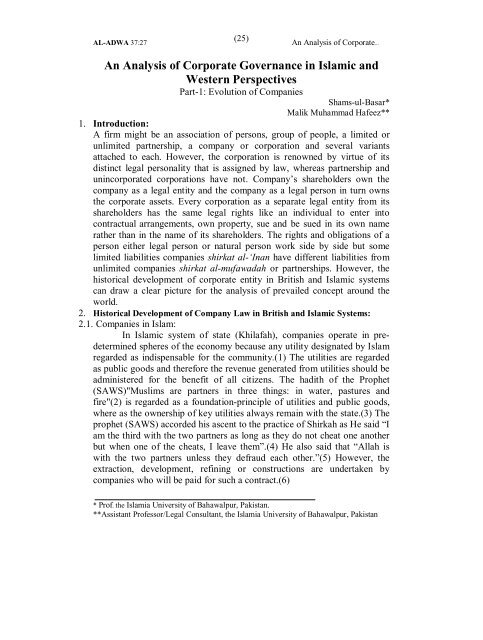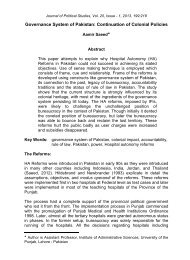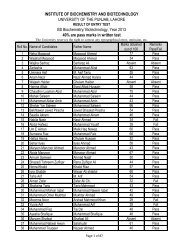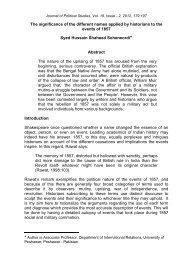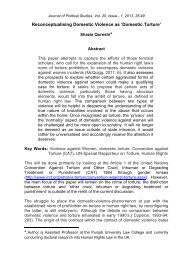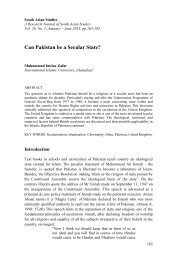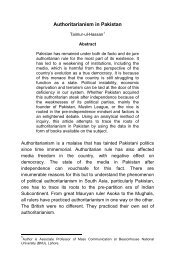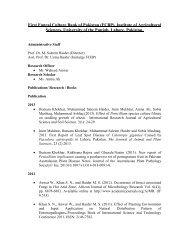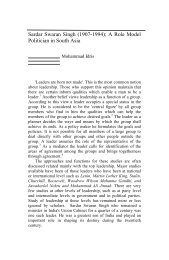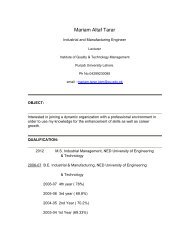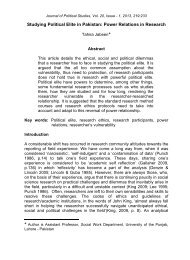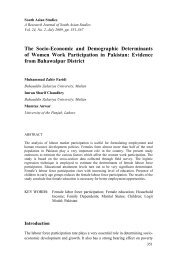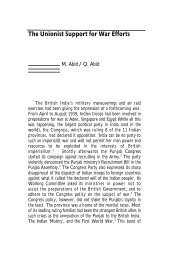Shams-ul-Basar AnAnalysis of corporate1_june2012.pdf
Shams-ul-Basar AnAnalysis of corporate1_june2012.pdf
Shams-ul-Basar AnAnalysis of corporate1_june2012.pdf
Create successful ePaper yourself
Turn your PDF publications into a flip-book with our unique Google optimized e-Paper software.
AL-ADWA 37:27<br />
(25)<br />
An Analysis <strong>of</strong> Corporate...<br />
An Analysis <strong>of</strong> Corporate Governance in Islamic and<br />
Western Perspectives<br />
Part-1: Evolution <strong>of</strong> Companies<br />
<strong>Shams</strong>-<strong>ul</strong>-<strong>Basar</strong>*<br />
Malik Muhammad Hafeez**<br />
1. Introduction:<br />
A firm might be an association <strong>of</strong> persons, group <strong>of</strong> people, a limited or<br />
unlimited partnership, a company or corporation and several variants<br />
attached to each. However, the corporation is renowned by virtue <strong>of</strong> its<br />
distinct legal personality that is assigned by law, whereas partnership and<br />
unincorporated corporations have not. Company’s shareholders own the<br />
company as a legal entity and the company as a legal person in turn owns<br />
the corporate assets. Every corporation as a separate legal entity from its<br />
shareholders has the same legal rights like an individual to enter into<br />
contractual arrangements, own property, sue and be sued in its own name<br />
rather than in the name <strong>of</strong> its shareholders. The rights and obligations <strong>of</strong> a<br />
person either legal person or natural person work side by side but some<br />
limited liabilities companies shirkat al-‘Inan have different liabilities from<br />
unlimited companies shirkat al-mufawadah or partnerships. However, the<br />
historical development <strong>of</strong> corporate entity in British and Islamic systems<br />
can draw a clear picture for the analysis <strong>of</strong> prevailed concept around the<br />
world.<br />
2. Historical Development <strong>of</strong> Company Law in British and Islamic Systems:<br />
2.1. Companies in Islam:<br />
In Islamic system <strong>of</strong> state (Khilafah), companies operate in predetermined<br />
spheres <strong>of</strong> the economy because any utility designated by Islam<br />
regarded as indispensable for the community.(1) The utilities are regarded<br />
as public goods and therefore the revenue generated from utilities sho<strong>ul</strong>d be<br />
administered for the benefit <strong>of</strong> all citizens. The hadith <strong>of</strong> the Prophet<br />
(SAWS)"Muslims are partners in three things: in water, pastures and<br />
fire"(2) is regarded as a foundation-principle <strong>of</strong> utilities and public goods,<br />
where as the ownership <strong>of</strong> key utilities always remain with the state.(3) The<br />
prophet (SAWS) accorded his ascent to the practice <strong>of</strong> Shirkah as He said “I<br />
am the third with the two partners as long as they do not cheat one another<br />
but when one <strong>of</strong> the cheats, I leave them”.(4) He also said that “Allah is<br />
with the two partners unless they defraud each other.”(5) However, the<br />
extraction, development, refining or constructions are undertaken by<br />
companies who will be paid for such a contract.(6)<br />
* Pr<strong>of</strong>. the Islamia University <strong>of</strong> Bahawalpur, Pakistan.<br />
**Assistant Pr<strong>of</strong>essor/Legal Cons<strong>ul</strong>tant, the Islamia University <strong>of</strong> Bahawalpur, Pakistan
AL-ADWA 37:27<br />
(26)<br />
An Analysis <strong>of</strong> Corporate...<br />
In the time <strong>of</strong> the Islamic Golden Age (since mid 8 th century till the<br />
invasion <strong>of</strong> Mongol in 13 th century) early forms <strong>of</strong> capitalism through trade<br />
in free markets are found in Islamic State (Caliphate). The organisational<br />
enterprises were formed for trade and business, which were independent<br />
from state with the concept <strong>of</strong> agency that also exits in modern corporate<br />
era. The Islamic contract law around 10 th century is assumed the classic<br />
form <strong>of</strong> business and corporate arrangement. The Roman Catholic Church<br />
during spilt <strong>of</strong> Christianity (1054) and the struggle to emancipate religion<br />
from the control <strong>of</strong> kings and feudal lords (1075-1122) began calling itself a<br />
corporation.(7) This struggle led to the rise <strong>of</strong> new canon law (jus novum) to<br />
deal with a wide range <strong>of</strong> issues including contract and corporate<br />
enactments for sec<strong>ul</strong>ar and ecclesiastical legal systems.<br />
The demise <strong>of</strong> Roman Empire weakened the state central authority<br />
and led to the diverse private legal system as means <strong>of</strong> enhancing<br />
organisational efficiency by which the western corporation evolved. The<br />
main focus <strong>of</strong> Christianity was matters <strong>of</strong> faith, morality and community.<br />
However, the pre-existing legal system i.e. Roman law is followed by early<br />
Christians in their daily ordinary and business life. It is also argued that<br />
Roman law directly or indirectly influenced the development <strong>of</strong> Islamic<br />
corporate system.(8) Muslim scholars argue that Roman law was influenced<br />
by the Syrian and Egyptian local customs and those local customs were<br />
governed and influenced by the followers <strong>of</strong> the prophet Ismail (AS) the son<br />
<strong>of</strong> Ibrahim(AS) and those customs and usages prevailed in those tribes with<br />
the passage <strong>of</strong> time. It is essential principle <strong>of</strong> Islamic jurisprudence that<br />
previous laws are part and parcel <strong>of</strong> Islamic law. Secondly Islam has its<br />
own principles <strong>of</strong> Halal and haram and as per Islamic injunctions each and<br />
every transaction needs proper approval <strong>of</strong> the Shariah, thus all customs<br />
and usages are subject to the approval <strong>of</strong> the Shariah. There two<br />
possibilities: 1. Islamic system <strong>of</strong> trade /transaction was influenced by<br />
Roman law. 2. Islamic law accepted certain transactions with the approval<br />
<strong>of</strong> the Islamic injunction. In transitional period <strong>of</strong> Islamic era, the<br />
inhabitants <strong>of</strong> Middle East including Muslims who had the legacy <strong>of</strong> the<br />
Roman system practiced the Roman institutional heritage that also<br />
contributed towards the formation <strong>of</strong> European corporate system. The early<br />
Arab empires partic<strong>ul</strong>arly Syrians and Egyptians studied and practiced the<br />
Roman law through local customs and usages. In Roman system, the<br />
Christian East laws reg<strong>ul</strong>ate the internal affairs <strong>of</strong> Monasteries that were<br />
centrally form<strong>ul</strong>ated. Monasteries were explicitly merged to form large<br />
organisation for creating large centres <strong>of</strong> power.(9) However, Muslim<br />
communities gained exposure from the Roman c<strong>ul</strong>ture either through<br />
business interaction with Roman traders or legal system <strong>of</strong> former Roman
AL-ADWA 37:27<br />
(27)<br />
An Analysis <strong>of</strong> Corporate...<br />
territories. At the time <strong>of</strong> the Islamic conquests, corporate life was mostly<br />
limited to the Roman Middle East territories than Eastern Empires.(10) The<br />
Muslims jurists focused on organisational efficiency when classic Islamic<br />
legal system took place between 7 th to 10 th centuries with the possibility that<br />
they might have influenced by Roman traditional system under the approval<br />
<strong>of</strong> the Prophet (SAWS) as Islamic law demands that each and every<br />
positive/good thing is treasurer <strong>of</strong> the mo’min/muslim, where from he found<br />
has the right to use it.(11)<br />
However, the start <strong>of</strong> Islamic era with the command <strong>of</strong> Prophet<br />
Muhammad (SAWS) led to the formation <strong>of</strong> Islamic legal system by<br />
modifying the existing customary laws <strong>of</strong> tribes that were immoral and<br />
against the Islamic principles rather abolition <strong>of</strong> previous system and<br />
practices as a whole. The Prophet (SAWS) established the norms <strong>of</strong> state and<br />
its political systems <strong>of</strong> governance. He had given an Islamic legal system to<br />
reg<strong>ul</strong>ate the all sphere <strong>of</strong> life. Although the Islamic law is presumed<br />
comprehensive but it also provides elasticity for legislation to meet-out the<br />
needs <strong>of</strong> society rather than stick on divine law. However, the new<br />
legislation sho<strong>ul</strong>d be based on basic principle <strong>of</strong> Islamic law provided in the<br />
Qur’an and Sunnah <strong>of</strong> the Prophet (SAWS). Islamic law not only covers the<br />
personal affairs <strong>of</strong> the people but also many aspects <strong>of</strong> politics, economics,<br />
banking, business or contract law and other social issues.(12)<br />
A Company (Shirkah) is regarded as an arrangement between two or<br />
more people to do some type <strong>of</strong> work in order to make pr<strong>of</strong>it and such pr<strong>of</strong>it<br />
is distributed among the contractual parties as dividend rather than salary.<br />
Islamic law defines shirkat or partnership in general as an underlying idea<br />
<strong>of</strong> mixing shares in such a way that one <strong>of</strong> them cannot be distinguished<br />
from the other. Shirkah has also been defined as a contract between two or<br />
more people for participation in a capital and its pr<strong>of</strong>it.”(13) The Islamic<br />
Law provides comprehensive frame work for contractual matters which are<br />
applied on companies. In Islamic system, the kinds <strong>of</strong> companies in<br />
contractual framework might be defined and classified in following<br />
manners:(14)<br />
Shirkat al-‘Uqood means two <strong>of</strong> more people come together making<br />
a contract for the investment <strong>of</strong> their capital and labour or reputation.<br />
It is <strong>of</strong> three kinds:<br />
a) Shirkat al-Amwal(The Company <strong>of</strong> Capitals)<br />
b) Shirkat al-A‘mal (The Company <strong>of</strong> Bodies)<br />
c) Shirkat al-wujooh (The Company <strong>of</strong> Reputations)<br />
Each <strong>of</strong> the above is sub-divided into two categories i.e., ‘Inan (limited) and<br />
mufawadah (unlimited).<br />
A. Shirkat al-Amwal:
AL-ADWA 37:27<br />
(28)<br />
An Analysis <strong>of</strong> Corporate...<br />
i. Shirkat al-Amwal by way <strong>of</strong> mufawadah in which two or more partners<br />
invests a sum <strong>of</strong> money equally in a business with equal footing in their<br />
capabilities and share its pr<strong>of</strong>it and loss according to agreement and will be<br />
responsible for each other transactional acts.<br />
ii.<br />
Shirkat al-Amwal by way <strong>of</strong> ‘Inan in which two partners invest their capital<br />
not necessarily with equal proportion <strong>of</strong> shares and run their business<br />
representing each other with no responsibility <strong>of</strong> loss.<br />
B. Shirkat al-A‘mal or Shirkat al-Abdan (The Company <strong>of</strong> Bodies or<br />
Labours):<br />
i. Shirkat al-A‘mal or Shirkat al-Abdan by way <strong>of</strong> mufawadah in which two<br />
or more people come together with their skills such as cons<strong>ul</strong>tants,<br />
doctors, engineers, craftsmen, lawyers and constitute the company with<br />
equal proportion <strong>of</strong> pr<strong>of</strong>it and loss and equal responsibility in business<br />
transactions.<br />
ii.<br />
Shirkat al-A‘mal or Shirkat al-Abdan by way <strong>of</strong> ‘Inan in which two or<br />
more people come together with their skills such as cons<strong>ul</strong>tants, doctors,<br />
engineers, craftsmen, lawyers and constitute the company with different<br />
proportions <strong>of</strong> shares in pr<strong>of</strong>it and loss e.g., 1/3 and 2/3 or ¼ and ¾ or any<br />
negotiated settlement.<br />
C. Shirkat al-Wujooh (The Company <strong>of</strong> reputation)<br />
i. Shirkat al-Wujooh by way <strong>of</strong> mufawadah (The Company <strong>of</strong> reputation) In<br />
this type <strong>of</strong> company, the capital is provided by silent partner and the<br />
reputation is used by the active partner both <strong>of</strong> them will be<br />
responsible/liable and having equal proportion <strong>of</strong> the pr<strong>of</strong>it and loss. The<br />
partners co<strong>ul</strong>d be rich merchant having guarantee for payment <strong>of</strong> debts<br />
and the company is backed by the wealthy partners.<br />
ii.<br />
Shirkat al-Wujooh by way <strong>of</strong> ‘Inan. In this type <strong>of</strong> business the capital is<br />
provided by the silent partners and reputation, standing and respect is used<br />
by the active partner having no responsibility/liability for each other and<br />
both <strong>of</strong> the partners having different proportions shares, pr<strong>of</strong>it and loss.(15)<br />
2.2 Evolution <strong>of</strong> British system <strong>of</strong> Companies:<br />
The Company or corporate governance is as old as the company or<br />
corporate form itself. During the 11 th to 13 th century associations <strong>of</strong><br />
merchants called ‘Merchant Guilds’. Guild means an association <strong>of</strong><br />
merchants or crafts people in medieval Europe which was formed to<br />
provide counseling to its members and to form<strong>ul</strong>ate r<strong>ul</strong>es and reg<strong>ul</strong>ation for<br />
trade. They obtained Charter from Crown to secure their members from<br />
practices <strong>of</strong> monopoly. Later on, this trading was known as ‘Commenda’ or<br />
‘Societas’.(16) These Guilds with the passage <strong>of</strong> time matured into family<br />
partnership and then partnership with outsiders. In 14 th century, the word<br />
‘company’ was adopted by certain merchants for trading overseas with
AL-ADWA 37:27<br />
(29)<br />
An Analysis <strong>of</strong> Corporate...<br />
certain privileges by Royal Charter. During 17 th century most <strong>of</strong> these<br />
companies started joint stock trade on their members’ behalf and these<br />
companies also established fixed capital represented by shares which was<br />
freely saleable and transferable. At that time, company was incorporated<br />
only by Royal Charter or act <strong>of</strong> Parliament. The first two decades <strong>of</strong> 18 th<br />
century witnessed the flood <strong>of</strong> fraud<strong>ul</strong>ent schemes <strong>of</strong> company flotation and<br />
the best example is South Sea Company and an associated company, the<br />
Sword Blade Company.(17)<br />
In 1720, the Parliament came down to remedy the deception <strong>of</strong><br />
investors through Bubble Act. The Act prohibited the use <strong>of</strong> corporation<br />
unless the corporation was authorized by Royal Charter or Act <strong>of</strong><br />
Parliament but the Act exempted from its application to: 1) all the<br />
undertaking established before 24 June, 1718 and, 2) two companies<br />
founded by Act; South Sea Company and the East India Company. This<br />
partic<strong>ul</strong>ar Act provided the benefits <strong>of</strong> the South Sea Company in<br />
competition with the Bank <strong>of</strong> England but this company failed and its<br />
shares decreased ridic<strong>ul</strong>ously.(18) In this crisis, the estates <strong>of</strong> the directors<br />
were confiscated for the benefit <strong>of</strong> the company. The similarity is found<br />
between the recent corporate crises i.e. Enron and HIH Ltd, where several<br />
<strong>of</strong> the directors and <strong>of</strong>ficers were prosecuted and jailed. Although the<br />
Bubble Act 1720 made impossible for companies to raise further capital by<br />
invitations to the public for the next hundred years to 1825 (repeal <strong>of</strong> the<br />
Bubble Act) but it does not destroy the unincorporated companies which<br />
continuously formed and freely issued their transferable shares.(19)<br />
In 19 th century, two new developments occurred in British corporate<br />
law: first, the Joint Stock Companies Act 1844 was enacted- under which<br />
any company comprising more than twenty five members with transferable<br />
shares might obtain incorporation by registering a deed <strong>of</strong> settlement<br />
executed by its members. Secondly, the Limited liability Act 1855 was<br />
passed which provided limited liability <strong>of</strong> the members <strong>of</strong> a company.(20)<br />
The act was repealed by the Joint Stock Companies Act 1856 that allowed<br />
incorporation <strong>of</strong> the companies with limited liability and introduced the<br />
memorandum and articles <strong>of</strong> association by omitting the provisional<br />
registration and deed <strong>of</strong> settlement. During 1862 to 1907, a number <strong>of</strong><br />
laws were passed that permitted the alteration <strong>of</strong> capital, the amendment<br />
<strong>of</strong> the memorandum and articles, as well as registration <strong>of</strong> private<br />
Companies. The Companies Consolidation Act 1908 gathered all the<br />
previous laws into single Act. The amendment <strong>of</strong> the law continued till<br />
the Act <strong>of</strong> 1907. In India, the company laws were introduced in 1850.<br />
This was followed by changes in 1857, 1866, 1887 till the law <strong>of</strong> 1913<br />
which based upon the English Law <strong>of</strong> 1908. Changes made in this law in
AL-ADWA 37:27<br />
(30)<br />
An Analysis <strong>of</strong> Corporate...<br />
1946 and these were based upon changes in the law <strong>of</strong> England.(21)<br />
However, the new Companies Act 1985 was introduced on the basis <strong>of</strong><br />
previous statutory developments. The Directors’ Liability Act <strong>of</strong> 1890<br />
created the directors’ liability to compensate all shareholders for damages<br />
suffered due to their untrue statements. 22 The Insolvency Acts (1986, 1994<br />
and 2000), the Company Directors Disqualification Act 1986, and the<br />
Enterprise Act 2002 also enacted to govern the insolvency, winding up and<br />
directors disqualification proceedings. Now the Companies Act 2006 is<br />
enacted that repealed the Companies Act 1985. New Companies Act 2006<br />
is comprehensive in which already legal principle <strong>of</strong> common law through<br />
court decisions also incorporated and codified to bring clarity for business<br />
and corporate communities.<br />
3. Conclusion:<br />
The companies and corporate activities are as old as societies. The<br />
corporate and trade activities have direct concern on state economy. That is<br />
why; these activities were reg<strong>ul</strong>ated under the supervision <strong>of</strong> state<br />
authorities rather than individuals themselves. The corporate norms <strong>of</strong><br />
earlier societies and empires prevailed in the later societies with some<br />
modifications that were required with the passage <strong>of</strong> time. The Roman legal<br />
c<strong>ul</strong>ture is influential in the development <strong>of</strong> western corporate system but the<br />
principles <strong>of</strong> Islamic law <strong>of</strong> contract are regarded as comprehensive<br />
business arrangements among the business communities and they laid down<br />
the basic principle <strong>of</strong> Islamic and western corporate law through partnership<br />
business in which companies are regarded as modern form <strong>of</strong> partnership or<br />
joint-stock companies.
AL-ADWA 37:27<br />
(31)<br />
An Analysis <strong>of</strong> Corporate...<br />
References<br />
1 Companies in Islam (26 Sept. 2007) available on<br />
http://www.khilafah.com/index.php/the-khilafah/economy/1029-companies-in-islam<br />
2 Abu Daud, S<strong>ul</strong>aiman b. Ash‘ath, Kitab-al-Buyu‘, Bab al-Shirkah, Hadith No. 3477, Dar<br />
al-Salam, Riadh, 1999/ 1420<br />
3 The Hadith <strong>of</strong> the Prophet (PBUH) is not only fundamental source <strong>of</strong> the Islamic Law<br />
after the Qur’an but also a source <strong>of</strong> interpretation <strong>of</strong> holy Quran in a practicable way.<br />
4 Abu Daud, S<strong>ul</strong>aiman b. Ash‘ath, Kitab-al-Buyu‘, Bab al-Shirkah, Hadith No. 3383, Dar<br />
al-Salam, Riadh, 1999/ 1420<br />
5 Ibn Qudamah, Abu‘Abd Allah, Ahmad b. Muhammad Al-Mughni, Vol: 5, Page 3,<br />
Maktabah’ Al-Riadh. 1981/1401.<br />
6 Companies in Islam (26 Sept. 2007) available on<br />
http://www.khilafah.com/index.php/the- khilafah/economy/1029-companies-in-islam<br />
7 Timur Kuran, ‘the Abesence <strong>of</strong> the Corporation in Islamic Law: Origin and Persistence’<br />
(2008) Department <strong>of</strong> Economics, University <strong>of</strong> Southern California, Los Angeles,<br />
USA available on http://dukespace.lib.duke.edu/dspace/bitstream/handle/10161/2546/Kuran_The_Absence_<strong>of</strong>.pdf?sequence=1<br />
8 Timur Kuran, (n. 6) at pp. 8-9<br />
9 Timur Kuran, (n. 6) at pp. 9; Joseph Patrich, Sabas, leader <strong>of</strong> Palestinian monasticism;<br />
a comparative study in eastern monasticism, fourth to seventh centuries, (Washington,<br />
D.C. 1995) 32-33<br />
10 Timur Kuran, (n. 6) at pp. 9; S. M. Stern, ‘the Constitution <strong>of</strong> the Islamic City’ in A. H.<br />
Hourani and S.M. Stern (eds.), The Islamic City, (Oxford 1970) at pp. 47-48<br />
11 Tirmidhi, Saleh b. ‘Abd al-Aziz, Jami’ al-Tirmidhi, Bab fi Fazl al-Fiqh ‘ala al-‘ibadah,<br />
page 610, Dar al-Salam linnashr wa-al-taudhi‘, al-Riadh, 1999/1420.<br />
12 Abd<strong>ul</strong>ssalam Mahmoud Abu-Tapanjeh, ‘Corporate governance from the Islamic<br />
perspective: A comparative analysis with OECD principles, Critical Perspective on<br />
Accounting 20 (2009) 556-567 at pp. 561<br />
13 Al-Jazivi, ‘Abd al-Rahman kitab al-Fiqh‘ala Madhahib al-arba‘ah Vol: 3 Page 63 Dar<br />
al-Ihya al-turath al-‘arabi, Baiv<strong>ul</strong>, p 1369.<br />
14 Companies in Islam (26 Sept. 2007) available on http://www.khilafah.com/index.php/thekhilafah/economy/1029-companies-in-islam<br />
15 Sarakhsi-shams al-Din, Al-Mabsoot, Vol:11 Page 151 Dar al-mu‘arif, Bairut,1987/1398<br />
16 J.H. Farrar& B.M. Hannigan, Farrar’s Company Law, 3rd Ed (Butterworths 1991) 16-18<br />
17 J.H. Farrar& B.M. Hannigan, (n. 14) 16-17<br />
18 J.H. Farrar& B.M. Hannigan, (n. 14) 16-17
AL-ADWA 37:27<br />
(32)<br />
An Analysis <strong>of</strong> Corporate...<br />
19 Jean J. Du Plessis, ‘Corporate Law and Corporate Governance Lesson from the Past:<br />
ebbs and flows, but far from “the end <strong>of</strong> history...”: Part 1’Comp. Law.2009,30(3) 1-75<br />
20 Jean J. Du Plessis, ‘Corporate Law and Corporate Governance Lesson from the Past:<br />
ebbs and flows, but far from “the end <strong>of</strong> history....”: Part 2’ Comp. Law.2009, 30(2) 43-51<br />
18 The Act 1856 was repealed by the Companies Act 1862, after that, different committees<br />
were established and the new companies’ law enactments (Companies Acts: 1890,<br />
1908, 1929, 1948, 1967, 1976, 1980, 1981, 1983, 1985 and 1989) were<br />
introduced to overcome the corporate crisis and the issues <strong>of</strong> corporate governance<br />
which rose with the passage <strong>of</strong> time.<br />
19 J.H. Farrar& B.M. Hannigan, (n. 14) 15-25


